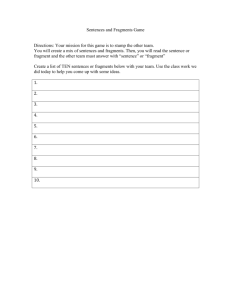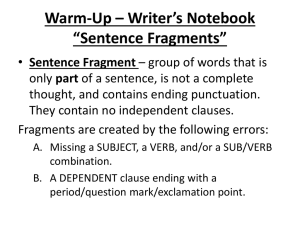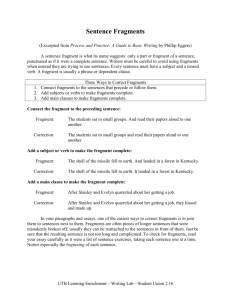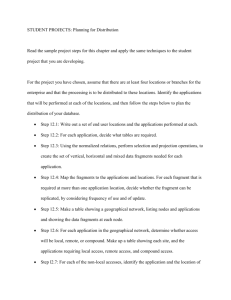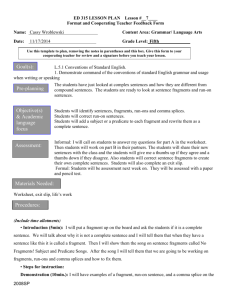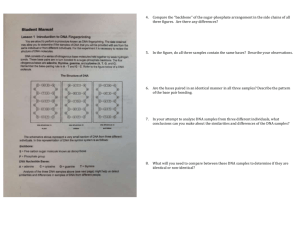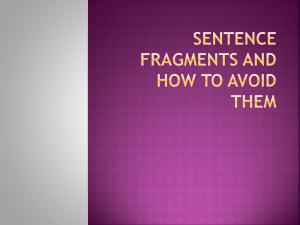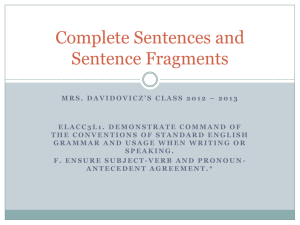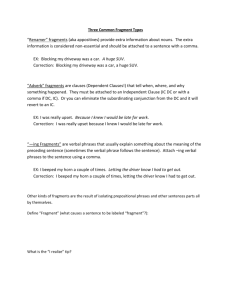Name: Beach Park Writing Sentences 2 Objective: In this lesson, you
advertisement
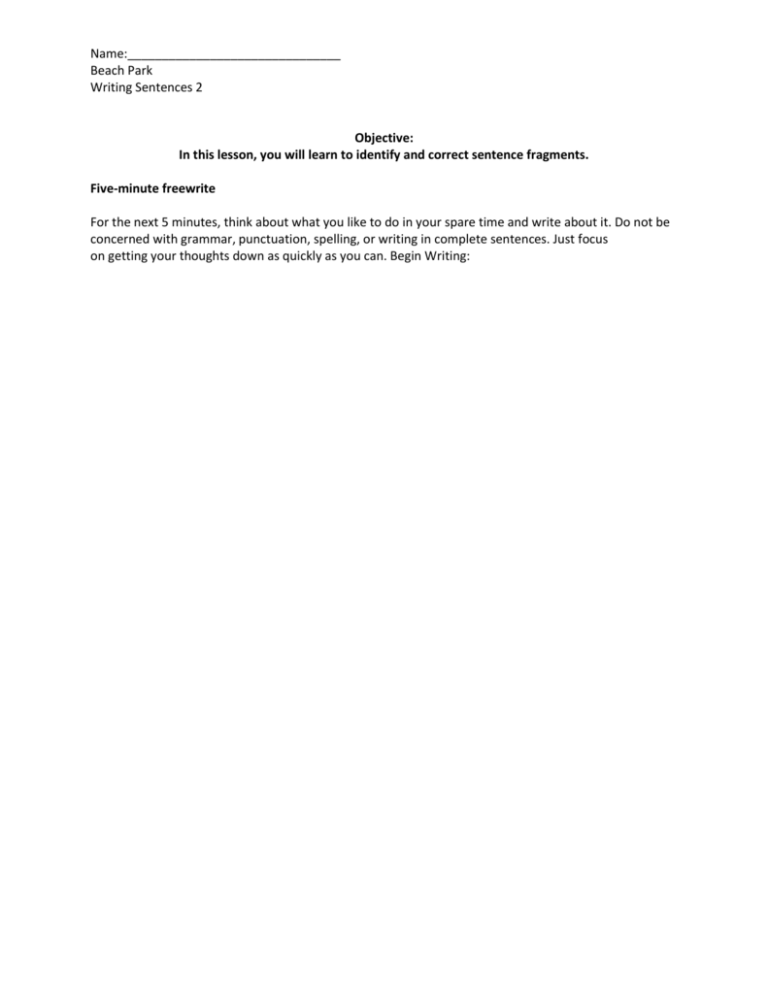
Name:_______________________________ Beach Park Writing Sentences 2 Objective: In this lesson, you will learn to identify and correct sentence fragments. Five-minute freewrite For the next 5 minutes, think about what you like to do in your spare time and write about it. Do not be concerned with grammar, punctuation, spelling, or writing in complete sentences. Just focus on getting your thoughts down as quickly as you can. Begin Writing: Name:_______________________________ Beach Park Writing Sentences 2 The Broken Glass Have you ever dropped something made of glass, watched it shatter into countless pieces, and wished you could pick up all the pieces and put them back together so that the original was as good as new? You can try with all your might, but the glass fragments just won't go together to make a whole object like the original, and there always seems to be at least one missing piece. This is the same principle of a sentence fragment. Most of the elements needed to make a sentence are there, but something is still missing. In this lesson, we are going to work on learning to identify sentence fragments and writing complete sentences from fragments. A sentence fragment is an incomplete sentence, phrase, or clause punctuated as if it were a complete sentence. A sentence may be incomplete because it lacks one or more elements. Can you spot the fragments in these sentences? 1. The tour group was supposed to arrive at the inn on Thursday. The next day. 2. Finally, he found the kitten. Stranded on a floating tree branch in the river. 3. I lost my patience. Because I asked him over and over not to pull my hair. 4. The ice cream is Strawberry Swirl. Marla's favorite. Write the fragments from the previous page in these spaces. 1. 2. 3. 4. 5. Many sentence fragments are used in informal conversations. Here are some fragments you might hear in everyday speech: Bad news! No sweat. As if? Whatever! Check ya later. Later, Dude! Love ya. Back soon. Could be trouble. Name:_______________________________ Beach Park Writing Sentences 2 In informal writing: Just a note to let you know we made the trip back. Now to unpack. In advertising: Finally, vegetables with no salt added. Free at last! 'Bout time. Vanilla Dr. Pepper! Great taste and only half the calories. Keeps going, and going, and going! In journalism: "They tell me that causes are in this year. Everybody champions a cause. Very kosher." In literature, for example, to represent casual conversation or convey disconnected thoughts or feelings: I waited for her to announce dinner. Waited. And waited. And waited some more. Finally, when my stomach felt glued to my backbone. The call came. "Dinner's ready." The sweetest words. Here are some sentences written about the picture. 1. The determined climber will crawl his way, inch by tortured inch, up the rocky face of the mountain. 2. For this experienced climber, the summit beckons at his fingertips. 3. Will the rock climber make it up the mountain? 4. What will happen if a rock gives way? These groups of words say different things, but they have something in common. Each is a complete sentence, a group of words that express a complete thought. The verb tells the action: crawls, beckons, make, gives. The subject tells who or what: climber, summit, climber, rock. A sentence fragment is a group of words that is punctuated as if it were a complete sentence. A fragment is confusing to the reader because it doesn't express a complete thought. The word groups below are the four example sentences you just read; however, some important words are left out. Notice how unclear the word groups become when they are written as fragments. 1. Crawls his way, inch by tortured inch, up the rocky face of the mountain. 2. Beckons at his fingertips. 3. Will the fragile rocks? 4. If one gives way? Name:_______________________________ Beach Park Writing Sentences 2 Sometimes a fragment is really part of the sentence that comes before or after it. You can correct this problem by attaching the fragment to the sentence it belongs with. 1. Fragment: The pizza is pepperoni. Clark's favorite. Corrected: The pizza is pepperoni, Clark's favorite. 2. Fragment: Cassia is practicing the splits. Because she wants to try out for cheerleader. Corrected: Cassia is practicing the splits because she wants to try out for cheerleader. 3. Fragment: The spectators roared their approval. When Bernie crossed the finish line. Corrected: The spectators roared their approval when Bernie crossed the finish line. Some words look like verbs when they really aren't. These "fake" verbs may fool you into thinking a group of words is a sentence when they are, in fact, really a fragment. A word that ends in -ing can't stand as a verb unless it has a helping verb, (a word such as is, are, was, were) with it. Read the examples below. Fragment: The alligators lazing in the muddy water. Corrected: The alligators were lazing in the muddy water. Fragment: The baby patting his hands together. Corrected: The baby was patting his hands together. Fragment Test How do you know when a group of words is a complete sentence and when it is a fragment? Use this simple three-part test to decide if a group of words is a complete sentence or a fragment. 1. Does the group of words have a subject? 2. Does the group of words have a verb? 3. Does the group of words express a complete thought? If you answer "no" to any of the three questions, the group of words is not a complete sentence. It is a fragment. In the spaces provided, correct these fragments to form complete sentences. Capitalize and punctuate each sentence as needed. 1. went to the lake last weekend 2. drove the truck and pulled the camper 3. mom in the car 4. rode with dad in the truck Name:_______________________________ Beach Park Writing Sentences 2 5. stopped at noon for lunch 6. ate hamburgers and French fries 7. also had a strawberry malt 8. camped some distance from the water 9. Dad and I caught 10. fried the fish we caught for supper An assignment for Your Student Writing Portfolio: Copy and paste your five-minute freewrite below. Then, revise your work making complete sentences. Add details or information (or, delete, if necessary) to make your sentences clearer and more effective. Begin Writing here:
